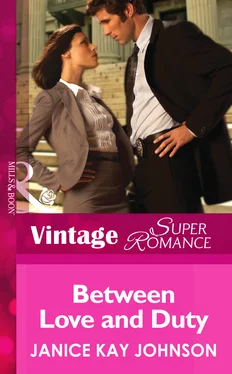The tinkle of shattering glass shot him into wakefulness, instantly alert and incredulous. Unbelievable. Somebody was breaking into his house. He immediately understood why. He hadn’t turned lights on and off the way he usually did. To somebody who hadn’t seen him pull into the garage at six o’clock, it would have looked as if nobody was home.
He might get a stress reliever after all, he thought with black humor.
Duncan didn’t lower the recliner; it might have creaked. Instead he reached for his weapon, which he’d earlier dropped on the side table along with his badge, and eased himself out of the chair. The fact that he’d kicked off his dress shoes was good. He could move far more silently in stockinged feet.
He used the light filtering in the front window to cross the living room without having to feel his way. The further tinkle of glass told him the intruder was brushing shards from the frame before climbing in. Or while climbing in. He knew it was the window in the utility room. Any second he’d hear…
Thud.
He’d left the wicker hamper of dirty clothes right in the middle of the small room. So his intruder didn’t have a flashlight, or hadn’t turned it on yet.
Duncan slipped down the hall and stationed himself to one side of the open doorway to the utility room. What he wanted to know was whether he had one trespasser, or more.
A dark shadow passed him. After a moment, he risked a look into the utility room. His vision was well-adjusted to the lack of light. Empty.
One, then.
He tracked the figure creeping down the hall then moved with a couple of long strides. Duncan slammed into the intruder and took him to the floor, where he held him down effortlessly and pressed the barrel of his gun against his neck.
“Police,” he barked. “You’re under arrest.”
“What the…?” A string of obscenities followed in a voice that was high enough that, for a moment, Duncan believed he’d just flattened one of the rare women who did breaking and entering. The next second, he thought in disgust, Oh, hell. It’s a kid.
“Hands behind your back,” he snapped, and grabbed both wrists when the boy obliged. Scrawny wrists. He realized the body he was holding down wasn’t very big. “All right, push yourself to your knees. That’s right. We’re getting to our feet.” He helped—roughly. He nudged the kid a short ways until they reached the light switch. “Face the wall,” he ordered. “Put your hands flat on the wall.”
He turned on the light and was momentarily blinded. He didn’t like that, but his intruder cringed from the brightness, too. Duncan waited until he could adequately see what he’d caught, then growled a profanity of his own.
“How old are you?”
Cheek ground against the wall, the Hispanic boy glared at him and stayed mute.
Duncan gave him a little shake. “Tell me.”
The boy muttered something. Duncan shook him again.
“Twelve.”
Well, damn. He hadn’t caught even a small fish tonight. This was a minnow.
Book the kid? Call the parents? What if there weren’t any?
He barely stifled a groan. Decision time.
THE BUILDING, DIVIDED INTO perhaps eight or ten apartments, was predictably ramshackle. Clapboard siding needed paint. Parking for tenants was on the street or in a very small dirt lot to one side, which was also home to a rusting hulk on cinder blocks. Another car, apparently ailing, had its hood up. Three men were bent over the engine. One had pants hanging so low, Jane Brooks could see way more than she wanted to. When she parked at the curb, another of the men glanced over his shoulder, but with a conspicuous lack of real interest.
She checked the folder on the passenger seat to verify the address. Yep, this was it. Number 203 was presumably upstairs. There was only one entrance, although fire escapes clung precariously to each end of the apartment house which, to her eye, didn’t stand quite square.
She’d been in worse places.
Jane locked her car and made her brisk way in, nodding and greeting a very young, very pregnant woman who was trying to maneuver into one of the downstairs apartments a playpen that didn’t quite want to fold the way it was supposed to. Jane held the door, smiled and chatted briefly in Spanish. She was lucky she’d taken it in high school. Currently, one-third of the kids in the local school district were Hispanic, up to half in two of the elementary schools, where instruction was in Spanish in the mornings, in English in the afternoons. She didn’t quite consider herself fluent, but she was getting there, what with her volunteer work at the alternative high school and then with the Guardian ad Litem gig.
She was acting today as a court-appointed Guardian ad Litem. Her task was to interview the adults involved, or potentially to be involved, in the life of a boy named Tito Ortez. Tito’s father was soon to be released from the Monroe Correctional Complex, and the judge would have to determine whether Tito could be returned to his custody. At the moment, the boy lived with his older sister, one Lupe Salgado, whose address this was. Eventually Jane would talk to Tito’s father, of course, Tito himself and perhaps even teachers. His report card suggested he wasn’t doing well in school.
The stairwell and hall were shabby but surprisingly clean. Upstairs she rapped firmly on the door displaying an upright metal 2, a listing 0 and a 3 that hung upside down.
“Venga,” a voice called, and after only a momentary hesitation Jane opened the door to find herself in a cramped living room.
Two young, black-haired children sat in front of the television, on which a small green dragon seemed to be trying to puff dandelion seeds but was, to his frustration, setting them on fire. Both children turned to stare at Jane. The girl stuck her thumb in her mouth. An ironing board was set up in the narrow space between a stained sofa and the wall. A Formica table with four chairs and a high chair was wedged into the remaining space. The spicy smell of cooking issued from the kitchen.
Jane raised her voice enough to be heard in the kitchen. “Hola. Me llamo Jane Brooks.”
A woman appeared, wiping her hands on a dish towel and looking flustered. “Sí, sí. I forgot you were coming. Perdone.” In a flurry of Spanish too fast for Jane, she spoke to the children, then gestured Jane into the kitchen. She was cooking, she explained, and couldn’t leave dinner unattended.
She did speak English, but not well; Jane made a mental note that living in a non-English-speaking household probably wasn’t helping Tito’s school performance. Jane and the boy’s sister continued to speak in Spanish.
Jane was urged to sit at a very small table with two chairs while her hostess continued to bustle around the kitchen.
“You’re Lupe?” she asked, for confirmation, and the young woman nodded.
Like the pregnant teenager downstairs, she had warm brown skin, long black hair and eyes the color of chocolate. She was pretty, but beginning to look worn. Plump around the middle, and moving as though her feet hurt.
Jane knew from the paperwork that Lupe was twenty-three. There had been other children born between Lupe, the oldest, and Tito, the youngest, but they were either on their own and unable to help with Tito or were in Mexico with their mother. Tito, Lupe explained, had stayed with his father because Mama thought as a boy he needed a man.
She shrugged expressively. “Then, one year after Mama returns to Mexico, Papa is arrested. So stupid! I called Mama, but she is living with an uncle and it is very crowded. So she begged me to keep Tito. Which I’ve done.”
As if this household wasn’t crowded. “You have children of your own,” Jane said, with what she thought was some restraint.
Читать дальше












